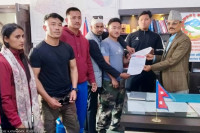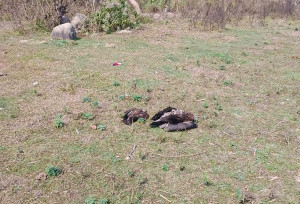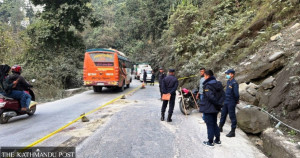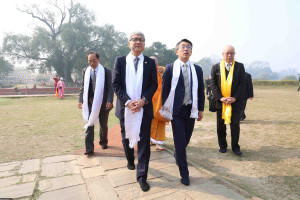Lumbini Province
Remote Rukum villages lack even basic health services
Difficult terrain and lack of awareness among residents pose a challenge to public health. People have to walk for many hours to reach district hospital.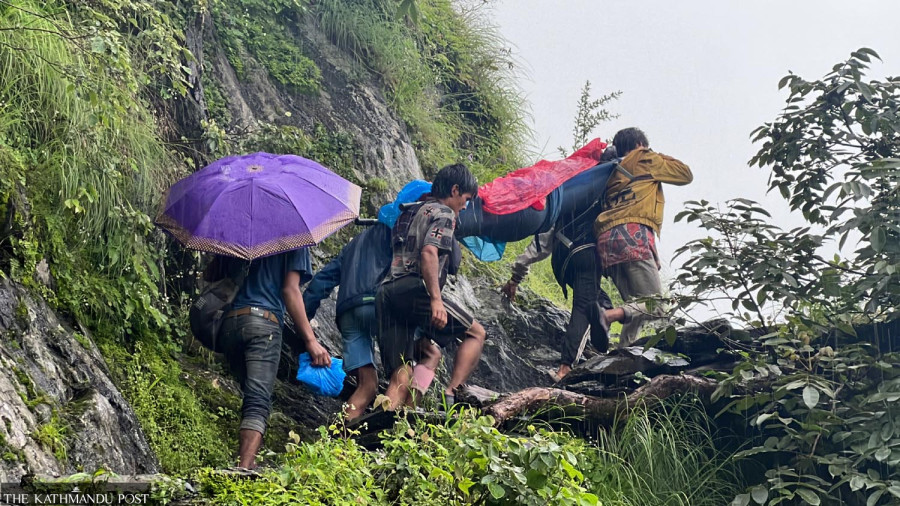
Mahesh KC
On August 12, four local men from Sisne Rural Rural Municipality-1 carried a 17-year-old post-partum woman on a stretcher from Deukhola to her home in Pakhapani, a 10-hour journey on foot.
The mother and her newborn were returning from the Chaurjahari Hospital in West Rukum about 85 km from Deukhola.
“It took us 10 hours to reach home. The road ends in Deukhola so we had to make the journey home to Pakhapani on foot,” said Ranaji Budha, the woman’s husband.
The then Sisne VDC comprising Thulo Sisne, Pakhapani, Lampakha, Okhrena, Bhattechaur and Bhanga is now Ward 1 of Sisne Rural Municipality. The settlements lying on the foothills of Mt Sisne do not have basic development infrastructures.
“There are no roads. We don’t have a good hospital in the village. The local health posts do not provide necessary health services,” said Chamare Budha, a local of Bhattechaur. “We cover long distances on foot just to be able to avail medical services.”
On August 13, Holistic Development Centre, a non-profit working to improve public health in the area, organised a health camp at Bhattechaur of Sisne targeting pregnant women. A four-month pregnant woman was advised not to tax herself physically since that would lead to a complicated pregnancy. The woman returned home carrying a 25-kg rice sack on her back since she would not be able to make the journey to Bhattechaur anytime soon. “I don’t know when I’ll be going to Bhattechaur again so I bought rice while I was there. There was no other option but to carry the rice sack on my way back home,” she said.
A community health unit at Pakhapani is run by an auxiliary health worker who is trained to provide only general health services whereas the health post at Bhattechaur has seven health workers including a senior auxiliary health worker. The Pakhapani villagers have no other choice but to walk to the health post in Bhattechaur in case of health emergencies.
However, since a visit to the health post in Bhattechaur is a last resort for the residents of Pakhapani, they reach the health post only at the eleventh hour. “The villagers come to the health post only when they face complications,’ said Kashiram Oli, in charge of the health post. “So besides asking them to go to a bigger hospital, I can’t do anything.”
According to Oli, a 25-year-old pregnant woman from Lampakha died on August 5 as she was brought to the health post when it was too late. “We tried our best but could not do anything for them,” said Oli. “She was taken to a hospital in Surkhet the next day, but neither she nor her baby could be saved.”
Lilamani Gautam, the executive director of the Holistic Development Centre, said that one of the main public health challenges in Rukum East is the lack of awareness about the importance of timely medical intervention. “People here still believe in faith healers and seek medical help after running out of options. The lives of every mother and child here are at risk due to early marriage and childbirth,” said Gautam. “Despite child marriage being illegal in Nepal, it is still practised widely among the rural population.”
According to Tuli Budha, a woman health worker volunteer in Okhrena, another major challenge for the local villagers is the difficult terrain. “People have to cross rivers and walk through rocky trails just to reach a health facility. Most people avoid going to health posts and hospitals because the journey is difficult,” said Budha. “The local health facilities do not have the equipment or the manpower so they refer patients to bigger hospitals. The locals would rather live with health issues than embark on a journey full of hassles.”
To reach the district hospital in Rukumkot, residents of the rural municipality have to walk for a day on narrow risky trails. “The foot trails are dangerous to walk on, especially during the monsoon season,” said Khim Kumari Budha, a local woman. “The risk of getting caught in a landslide is always high. One first has to reach Deukhola in Ward 14 of Putha Uttarganga Rural Municipality from Pakhapani. But even in Deukhola, vehicles are rarely available.”
To reach Rukukot from Pakhapani, one has to change vehicles at least thrice, says Khim.
“The rural people do not have access to health services easily so we first try to get cured in the village itself,” said Khim. “We go to faith healers first and only when all else fails, we go to see a doctor.”
According to Raj Bahadur Budha, chairman of Ward 1 of Sisne Rural Municipality, efforts are being made to develop the health services in the ward, and soon after the ward gets connected to electricity, the rural municipal office will start the work.
“We are doing our best, but we are limited by our resources and funds. In order to develop health services in such a remote place as this, the central and provincial governments also have to pay attention,” said Raj Bahadur.
Sisne-1 is not connected to the road network nor has an electricity supply. Given the poor connectivity, the people here are left with no income or employment.
“Due to the difficult topography, it is very hard to bring developmental or social changes here,” said Raj Bahadur. “Hopefully, we will be connected to a road network in the near future so that development can take place.”




 8.88°C Kathmandu
8.88°C Kathmandu




